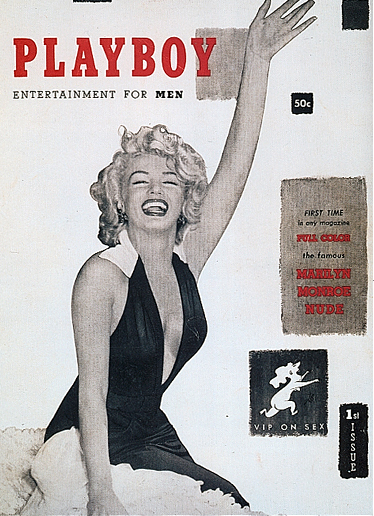December 10: The First Playboy, Hugh M. Hefner
Hugh M. Hefner and Playboy (1953)
It was on this date, December 10, 1953, that the first issue of Playboy magazine was published, undated, by 27-year-old Chicago-born entrepreneur Hugh Marston Hefner. A former promotional copywriter for Esquire magazine, Hugh Hefner begged, borrowed and invested $7,600 to print his first issue — undated because he wasn't sure there would be a second issue — and included in it a now-classic, nude calendar photo of actress Marilyn Monroe. Fifty-thousand issues of the first Playboy sold nationwide, assuring that there would indeed be a second issue. Quipped Hefner, years later, "If there was going to be a sexual revolution, I would be its pamphleteer."
"I've never thought of Playboy, quite frankly, as a sex magazine," Hefner said in a 2002 CNN profile. "I always thought of it as a lifestyle magazine in which sex was one important ingredient."[1] And indeed Hefner's 200,000-word explanation of the Playboy Philosophy, mercifully serialized, covers not just sex but freedom generally: individual rights, censorship, repression, homosexuality and religion.
It started in his youth: "I was a very idealistic, very romantic kid in a very typically Midwestern Methodist repressed home," said Hefner.[2] But later he learned how organized religion, as opposed to the amorphous spirituality Hefner now professes, really degrades the outlooks of both men and women. "One of the problems with organized religion," said Hefner to his former employer, Esquire, "is that it has always kept women in a second-class position. They have been viewed as the daughters of Eve."[3]
As Hefner phrased it in the Playboy Philosophy excerpts printed in the 50th anniversary issue of his magazine,
If a man has a right to find God in his own way, he has a right to go to the devil in his own way also. It sometimes happens that the man most other men would agree is surely going to the devil has instead discovered a new truth that is leading him away from established thought and tradition to a better way. In time these other men will understand and follow. ...
We're applying 16th century religion to a 20th century world; a more sophisticated time requires a more sophisticated faith. There's no logic in the belief that man's body, mind and soul are in conflict rather than in harmony with one another. ...
Religious leaders can attempt to persuade us of the correctness of their beliefs — they have this right, and indeed it is expected of them. They have no right, however, to attempt in any way to force their beliefs on others. And most especially, they have no right to use the power of the government to implement such coercion.[4]
As is to be expected, Hefner sees freedom as beginning with sexual freedom, but certainly not ending there. Often criticized by the puritan contingent of the feminist movement he and his magazine had supported from the beginning, Hefner replies,
Everybody, if they've got their head on straight, wants to be a sexual object, among other things. They want to be attractive. Otherwise, what a sad and pathetic life. To really live a worthwhile life is to be attracted to and attractive to other people.[5]
Where once women were straining against men telling them what they could and could not do with their bodies and their lives, it was ironic, at least to Hefner, that some women allow other women to be just as condescending. "Playboy exploits sex the way Sports Illustrated exploits sports," says Hefner.[6]
About his own ideas on mortality, Hefner says, "I'm very comfortable with the nature of life and death, and that we come to an end." So, what does he think happens after death?
I haven't a clue. I'm always struck by the people who think they do have a clue. It's perfectly clear to me that religion is a myth. It's something we have invented to explain the inexplicable. My religion and the spiritual side of my life come from a sense of connection to the humankind and nature on this planet and in the universe. I am in overwhelming awe of it all: It is so fantastic, so complex, so beyond comprehension. What does it all mean — if it has any meaning at all? But how can it all exist if it doesn't have some kind of meaning? I think anyone who suggests that they have the answer is motivated by the need to invent answers, because we have no such answers.[7]
[1] "'Hef': The legend wore silk pajamas" (Hugh Hefner profile), CNN.com, n.d. (2002). [2] Hugh Hefner, interview with Chris Colin, Salon, 28 December 1998. [3] Hugh Hefner, quoted by Wil S. Hylton in Esquire, June 2002. [4] Playboy, "The 12-Minute Playboy Philosophy," January 2004 (50th anniversary issue). [5] Hugh Hefner, quoted by Wil S. Hylton in Esquire, June 2002. [6] Interview with Brooke Gladstone, "On the Media" (WNYC/NPR), 29 November 2002. [7] Playboy interview, January 2000.
Originally published December 2003.


